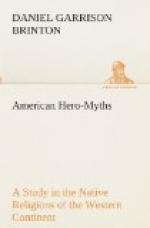Viracocha was also worshiped under the title Con-ticci-Viracocha. Various explanations of the name Con have been offered. It is not positively certain that it belongs to the Qquichua tongue. A myth preserved by Gomara treats Con as a distinct deity. He is said to have come from the north, to have been without bones, muscles or members, to have the power of running with infinite swiftness, and to have leveled mountains, filled up valleys, and deprived the coast plains of rain. At the same time he is called a son of the Sun and the Moon, and it was owing to his good will and creative power that men and women were formed, and maize and fruits given them upon which to subsist.
Another more powerful god, however, by name Pachacamac, also a son of the Sun and Moon, and hence brother to Con, rose up against him and drove him from the land. The men and women whom Con had formed were changed by Pachacamac into brutes, and others created who were the ancestors of the present race. These he supplied with what was necessary for their support, and taught them the arts of war and peace. For these reasons they venerated him as a god, and constructed for his worship a sumptuous temple, a league and a half from the present city of Lima.[1]
[Footnote 1: Francisco Lopez de Gomara, Historia de las Indias, p. 233 (Ed. Paris, 1852).]
This myth of the conflict of the two brothers is too similar to others I have quoted for its significance to be mistaken. Unfortunately it has been handed down in so fragmentary a condition that it does not seem possible to assign it its proper relations to the cycle of Viracocha legends.
As I have hinted, we are not sure of the meaning of the name Con, nor whether it is of Qquichua origin. If it is, as is indeed likely, then we may suppose that it is a transcription of the word ccun, which in Qquichua is the third person singular, present indicative, of ccuni, I give. “He Gives;” the Giver, would seem an appropriate name for the first creator of things. But the myth itself, and the description of the deity, incorporeal and swift, bringer at one time of the fertilizing rains, at another of the drought, seems to point unmistakably to a god of the winds. Linguistic analogy bears this out, for the name given to a whirlwind or violent wind storm was Conchuy, with an additional word to signify whether it was one of rain or merely a dust storm.[1] For this reason I think M. Wiener’s attempt to make of Con (or Qquonn, as he prefers to spell it) merely a deity of the rains, is too narrow.[2]
[Footnote 1: A whirlwind with rain was paria conchuy (paria, rain), one with clouds of dust, allpa conchuy (allpa, earth, dust); Holguin, Vocabulario Qquichua, s.v. Antay conchuy.]
[Footnote 2: Le Perou et Bolivie, p. 694. (Paris, 1880.)]




